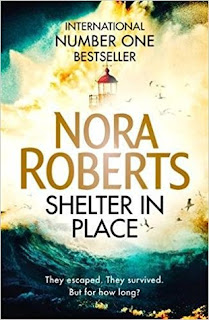The start of February seems like an age ago, the depths of winter, whereas now, although it still is winter of course, the light has changed and the bulbs are are up in the garden and it feels like spring is on the way. I like winter a lot and that hasn't changed, but this year I think I'm ready for it to be gone.
Thank God for books, I do not know what I would do without them at the moment (and for the last couple of years), the world is so awful. Thus, lots of reading this month, eight books in all. These are they:
11. The Dead of Winter by Nicola Upson
12. Wintering by Katherine May
13. Dear Mrs. Bird by A.J. Pearce
14. After by Dr. Bruce Greyson
15. The Lark by E. Nesbit
16. Project Hail Mary by Andy Weir
17. Murder by the Book edited by Martin Edwards
18. Bewildering Cares by Winifred Peck
So, quite a varied bunch this month. Six fiction reads, two non-fiction. A good month because there were no duds, nothing that was a terrible disappointment. I think this might possibly be because I'm getting more and more skilled at choosing books I think I will like. And also better at abandoning those I'm not enjoying. I don't do that lightly but there was one this month that I stopped reading after about forty pages thinking, 'I just don't give a monkey's!'
Favourite book of the month? I don't think I can choose. Three stood out: Dear Mrs. Bird by A.J. Pearce, Project Hail Mary by Andy Weir and After by Bruce Greyson. But all the rest were good too, and I would have no hesitation in recommending any of them. It's been a pretty good month all told.
So, currently reading? Well, this:
I mean, who knew? I certainly did not think I would become smitten with standalone books by Nora Roberts. But Shelter in Place is a 'terrific' read, set in Maine and dealing with the aftermath of a massacre perpetrated by three boys in their late teens. The book is about the survivors and is so, 'so' good, I can't put it down.
In my Books read in January post I listed eight or nine books as a pool to read from in February. I managed to read four of those and am quite happy with that, so I thought I'd do it again.
Books for the 'Round the World' challenge, category - Eastern Europe:
Along the Enchanted Way - William Blacker (Romania)
The Sunny Side of the Alps - Roy Clark (Slovenia)
The Thread - Victoria Hislop (Greece)
For the Back to the Classics challenge:
The Age of Innocence - Edith Wharton
The Mysterious Mr. Quinn - Agatha Christie
Sundry:
Blind Search - Paula Munier
The Other Bennet Sister - Janice Hadlow
Percy Jackson and the Sea Monsters - Rick Riordan
The Buried Giant - Kazuo Ishiguro
The Unexpected Inheritance of Inspector Chopra - Vaseem Khan
Waiting for the Albino Dunnock - Rosamund Richardson (non-fiction about bird watching)
Two books about The Queen:
The Windsor Knot - S. J. Bennett
The Uncommon Reader - Alan Bennett (a 3rd. or 4th. reread)
Of course there's no way on Earth I'll manage to read all of those in one month, but I'm a list person and find it helps to have some idea of the books I would like to read each month and most importantly - write them down! I don't feel compelled to always read from that list of course and very often do go completely off piste when a sudden fancy takes me.
Happy reading in March and take care.













